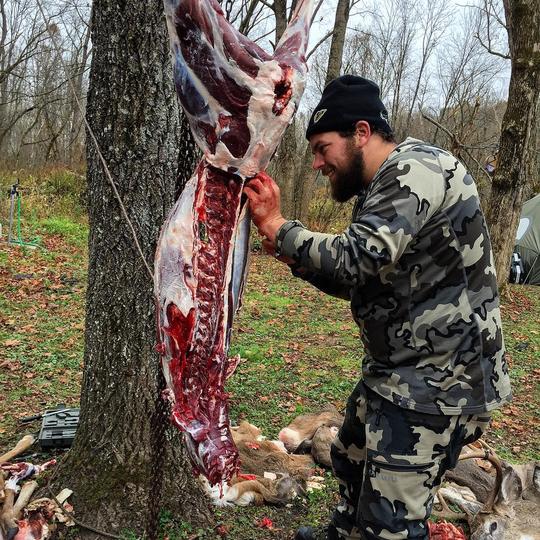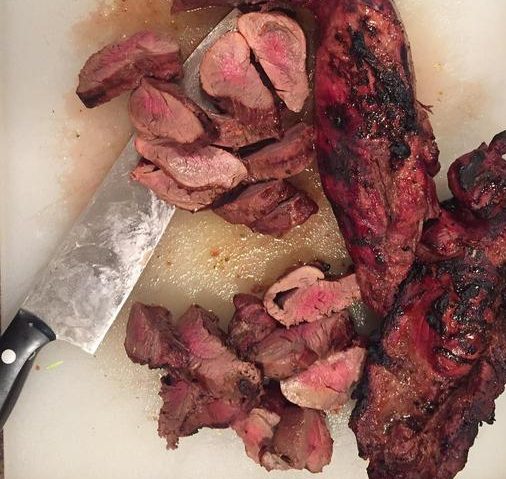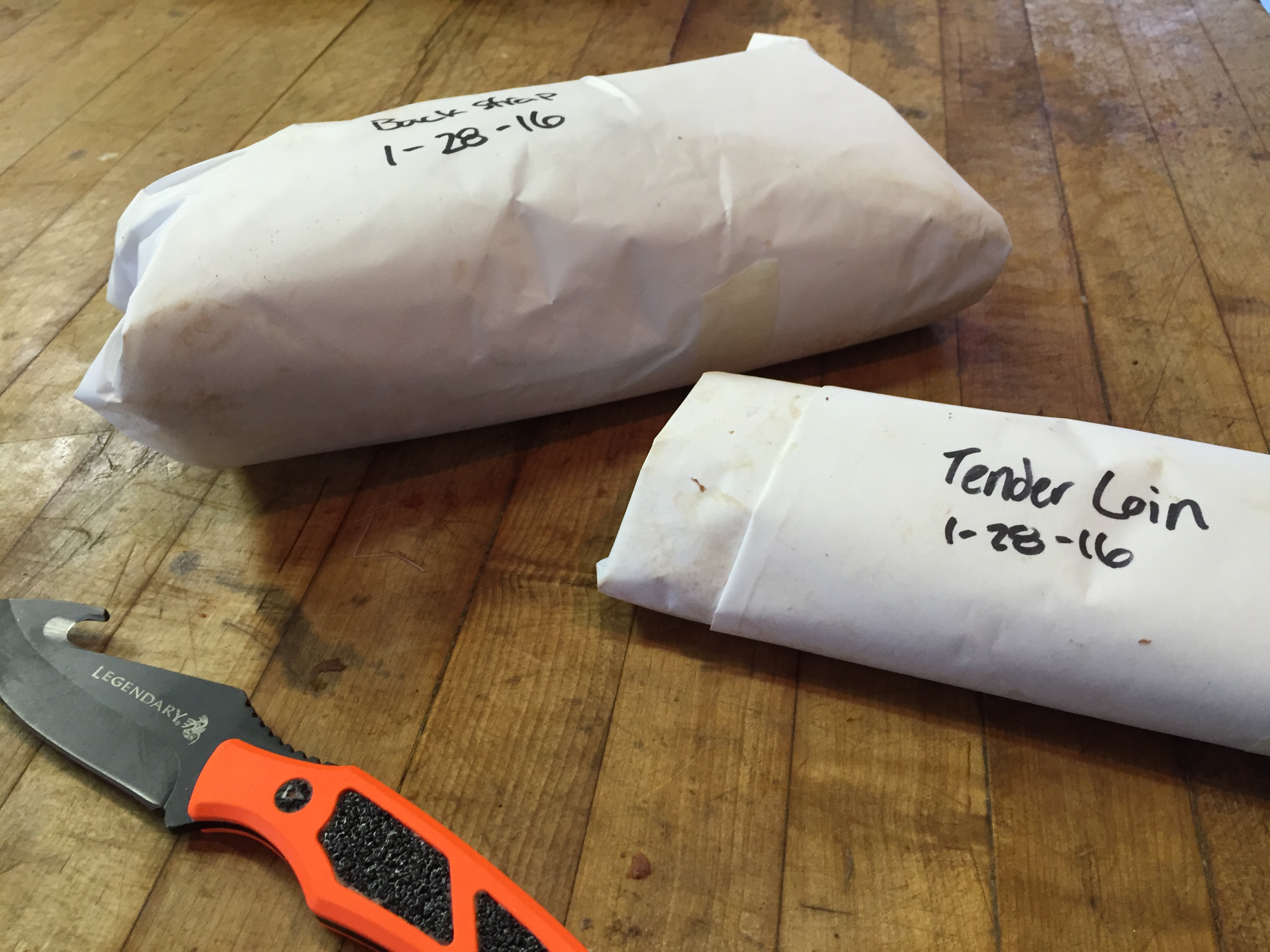The hunt is over and you have returned home victorious with the spoils. If you are choosing to prep the meat yourself and want to rid it of that sometimes “gamey” flavor, here are a few things to keep in mind.
1.) Practice Proper Cleaning
A good deal of preventing the gaminess in wild game is cleaning the carcass quickly and properly. First, you should gut the animal as soon as possible. By removing the innards, it allows the muscle (meat) to cool faster so it doesn’t produce the enzymes that give off that undesirable flavor. Afterwards, the hide, fat, and bone (depending on cut) needs to be removed as efficiently as possible. Removing the hide and bone allows the muscle to cool faster. Unlike domesticated beef, the fat on wild game is not tasty and is one source of gamey flavor.
 Butchering your deer soon after the kill is one way to ensure the meat will cool properly and stay fresh. Of course, some prefer to hang it for a while if the temperature is right.
Butchering your deer soon after the kill is one way to ensure the meat will cool properly and stay fresh. Of course, some prefer to hang it for a while if the temperature is right.
Keep your venison clean and cool every step of the way. Get that deer butchered and into the freezer within a day or two. If you can do that, your venison will taste great.
But even then, don’t expect it to taste like cow meat. These days, even beef doesn’t taste like beef. One reason for this is because most American beef is now raised in feedlots. When people try grass-fed beef because they’ve heard it’s healthier or more flavorful, they often decide it’s not for them. It has a different flavor—almost like venison.
Free-range organic venison doesn’t naturally taste “gamey.” It naturally tastes great. Removing the silver skin from the individual muscle groups will also help your venison taste great. Instead of disguising that natural flavor with sauces, marinades, and gallons of cheap Italian dressing in giant plastic jugs, let’s celebrate and savor it.
2.) Soak the Meat
One of the most common ways to remove gamey flavor from game meat is to soak the meat before you freeze it. As to what liquid to use, that is the topic of hot debate. Ask a group of hunters what they use and you will find a hundred different answers.
Common soaking liquids include saltwater, milk, buttermilk, vinegar, or lemon juice. There are many hunters that swear by dairy products when it comes to removing gaminess as dairy “bleeds out” many meats, with blood being a source of gamey flavor. This is also a useful technique to use if you are trying to save particularly bloodshot meat, but sometimes even soaking it in yogurt is not enough for the worse cases.
3.) Freeze Properly
You went through all the effort to properly prepare the meat, so what a shame it would be if it ended up getting all freezer burnt. This often happens when you try to freeze a lot of meat in one container or package. Put in the extra effort and individually wrap or vacuum seal each cut so that no air will get trapped in there and cause the devastating tragedy that is freezer burn.
Vacuum sealed packages work the best, but even wrapping meat well in plastic wrap or butcher paper can keep it fresh for over a year.
4.) Don’t Overcook It
The most important thing to remember: Don’t overcook it. On the grill, it takes just seconds for steaks to go from perfection to overdone shoe leather. How long you cook your venison makes way more difference than the age of the deer, how long it was aged while hanging from the oak tree in your front yard, or pretty much any other venison variable you can think of. With a slow cooker, no worries. But with just about any other cooking method, a little overcooking can negate everything you’ve done right up until now. Unlike beef or pork, venison has very little intramuscular fat that’s marbled right into the meat. That doesn’t mean venison has to be dry. It does, however, mean you can’t get away with overcooking it.
 Here’s what a perfectly cooked piece of tenderloin looks like.
Here’s what a perfectly cooked piece of tenderloin looks like.
When all else fails…
5.) Pick a Good Marinade
Everybody knows somebody that automatically turns down a venison meal just because they heard the word VENISON. Well, I’m sure many of us have also gotten away with serving venison under the disguise of beef as well, and the unsuspecting guest loved it! While venison is very tasty alone, as long as it’s not overcooked, it’s nice to mix it up every now and then by adding some additional flavors.
After prepping the meat as best you can, giving it a good soak, and freezing it properly, there should be little to no residual gaminess, depending on how practiced you are at processing. So, what is the best way to cover up that remaining wild game flavor? Marinades.
While venison benefits from marinades that help keep it moist, a number of wild game recipes require marinades beforehand since the stronger flavors go a long way to completely remove gamey flavor from the meat. However, just like what liquid you want to soak meat in before freezing, you will find no two hunters will ever agree on what marinade to use, especially since it also varies depending on what recipe you are making with what game meat.
The one thing that hunters can agree on when marinating wild game is that you need to start that soak, at the very least, four hours prior to cooking. The recommended time is actually more like six hours so that it can fully absorb all those tasty flavors. The longer the marinade, the better tasting the meat, so don’t be afraid to leave it sit overnight if you won’t have time to marinate the next day.






